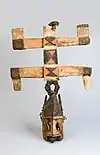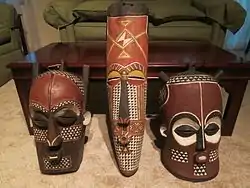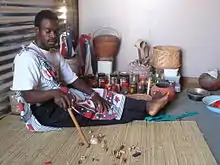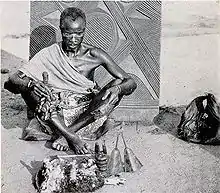Traditional African religions
The traditional African religions or traditional beliefs and practices of African people are a set of highly diverse beliefs that includes various ethnic religions.[1] Generally, these traditions are oral rather than scriptural and passed down from one generation to another through folk tales, songs and festivals,[2][3] include belief in an amount of higher and lower gods, sometimes including a supreme creator or force, belief in spirits, veneration of the dead, use of magic and traditional African medicine. Most religions can be described as animistic[4][5] with various polytheistic and pantheistic aspects.[6][1] The role of humanity is generally seen as one of harmonizing nature with the supernatural.[1][7]
| Part of a series on |
| Traditional African religions |
|---|
 |
|

Spread
Adherents of traditional religions in sub-Saharan Africa are distributed among 43 countries and are estimated to number over 100 million.[8][9]
Although the majority of Africans today are adherents of Christianity or Islam, African people often combine the practice of their traditional belief with the practice of Abrahamic religions.[10][11][12][13][14] The two Abrahamic religions are widespread across Africa, though mostly concentrated in different areas. They have replaced indigenous African religions, but are often adapted to African cultural contexts and belief systems.[15]
Followers of traditional African religions are also found around the world. In recent times, traditional religions, such as the Yoruba religion, are on the rise. The religion of the Yoruba is finding roots in the Islands of the Caribbean and portions of Central and South America. In the United States Vudon is more predominant in the states along the Gulf of Mexico.[16]
Basics
Animism builds the core concept of traditional African religions, this includes the worship of tutelary deities, nature worship, ancestor worship and the belief in an afterlife. While some religions adopted a pantheistic worldview, most follow a polytheistic system with various gods, spirits and other supernatural beings.[17] Traditional African religions also have elements of fetishism, shamanism and veneration of relics.[18]
Traditional African religions can be broken down into linguistic cultural groups, with common themes. Among Niger–Congo-speakers is a belief in a creator God, force or higher deity, which is considered by some to be a widespread and ancient feature of Niger-Congo-cultures,[19][20][21] along with other more specialized deities, ancestor spirits, territorial spirits, and beings, as well as evil caused by human ill will and neglecting ancestor spirits, and priests of territorial spirits.[21][22] New world religions such as Santería, Vodun, and Candomblé, would be derived from this world. Among Nilo-Saharan speakers is the belief in Divinity; evil is caused by divine judgement and retribution; prophets as middlemen between Divinity and man. Among Afro-Asiatic-speakers is henotheism, the belief in one's own gods but accepting the existence of other gods; evil here is caused by malevolent spirits. The Semitic Abrahamic religion of Judaism is comparable to the latter world view.[23][24][20] San religion is generally non-theistic but a belief in a Spirit or Power of existence which can be tapped in a trance-dance; trance-healers.[25]
Some researchers, including historical ethnolinguist Christopher Ehret, suggest that certain monotheistic concepts, such as the belief in a creator god or force (next to other gods, deities and spirits) are ancient and indigenous among peoples of the Niger-Congo ethnolinguistic family (of much of West Africa and Central Africa) and date to the beginning of their history, in a form substantially different from the monotheism found in Abrahamic religions. Traditional Niger-Congo religion also included polytheistic and animistic elements.[26][20][21][27]
Traditional African medicine is also directly linked to traditional African religions. According to Clemmont E. Vontress, the various religious traditions of Africa are united by a basic Animism. According to him, the belief in spirits and ancestors is the most important element of African religions. Gods were either self-created or evolved from spirits or ancestors which got worshiped by the people. He also notes that most modern African folk religions were strongly influenced by non-African religions, mostly Christianity and Islam and thus may differ from the ancient forms.[28]
Nigerian American professor of indigenous African religions at Harvard University, Jacob Olupona summarized the many traditional African religions as complex animistic religious traditions and beliefs of the African people before the Christian and Islamic "colonization" of Africa. Ancestor veneration has always played a "significant" part in the traditional African cultures and may be considered as central to the African worldview. Ancestors (ancestral ghosts/spirits) are an integral part of reality. The ancestors are generally believed to reside in an ancestral realm (spiritworld), while some believe that the ancestors became equal in power to deities.[29]
The defining line between deities and ancestors is often contested, but overall, ancestors are believed to occupy a higher level of existence than living human beings and are believed to be able to bestow either blessings or illness upon their living descendants. Ancestors can offer advice and bestow good fortune and honor to their living dependents, but they can also make demands, such as insisting that their shrines be properly maintained and propitiated. A belief in ancestors also testifies to the inclusive nature of traditional African spirituality by positing that deceased progenitors still play a role in the lives of their living descendants.
Olupona rejects the western/islamic definition of Monotheism or Polytheism and says that such concepts could not reflect the complex African traditions and are simplistic. While some traditions have a supreme being (next to other deities), others have not. Monotheism does not reflect the multiplicity of ways that the traditional African spirituality has conceived of deities, gods, and spirit beings. He summarizes that traditional African religions are not only religions, but a worldview, a way of life.[30]
Ceremonies
West and Central African religious practices generally manifest themselves in communal ceremonies or divinatory rites in which members of the community, overcome by force (or ashe, nyama, etc.), are excited to the point of going into meditative trance in response to rhythmic or driving drumming or singing. One religious ceremony practiced in Gabon and Cameroon is the Okuyi, practiced by several Bantu ethnic groups. In this state, depending upon the region, drumming or instrumental rhythms played by respected musicians (each of which is unique to a given deity or ancestor), participants embody a deity or ancestor, energy or state of mind by performing distinct ritual movements or dances which further enhance their elevated consciousness.[31]
When this trance-like state is witnessed and understood, adherents are privy to a way of contemplating the pure or symbolic embodiment of a particular mindset or frame of reference. This builds skills at separating the feelings elicited by this mindset from their situational manifestations in daily life. Such separation and subsequent contemplation of the nature and sources of pure energy or feelings serves to help participants manage and accept them when they arise in mundane contexts. This facilitates better control and transformation of these energies into positive, culturally appropriate behavior, thought, and speech. Also, this practice can also give rise to those in these trances uttering words which, when interpreted by a culturally educated initiate or diviner, can provide insight into appropriate directions which the community (or individual) might take in accomplishing its goal.[32]
Spirits
Followers of traditional African religions pray to various spirits as well as to their ancestors.[33] This includes also nature, elementary and animal spirits. The difference between powerful spirits and gods is often minimal. Most African societies believe in several “high gods” and a large amount of lower gods and spirits. There are also religions with a single Supreme being (Chukwu, Nyame, Olodumare, Ngai, Roog, etc.).[34] Some recognize a dual god and goddess such as Mawu-Lisa.[35]
Traditional African religions generally believe in an afterlife, one or more Spirit worlds, and Ancestor worship is an important basic concept in mostly all African religions. Some African religions adopted different views through the influence of Islam or even Hinduism.[36]
Practices and rituals

There are more similarities than differences in all traditional African religions.[37] The deities and spirits are honored through libation or sacrifice (of animals, vegetables, cooked food, flowers, semi-precious stones and precious metals). The will of the gods or spirits is sought by the believer also through consultation of divinities or divination.[38] Traditional African religions embrace natural phenomena – ebb and tide, waxing and waning moon, rain and drought – and the rhythmic pattern of agriculture. According to Gottlieb and Mbiti:
The environment and nature are infused in every aspect of traditional African religions and culture. This is largely because cosmology and beliefs are intricately intertwined with the natural phenomena and environment. All aspects of weather, thunder, lightning, rain, day, moon, sun, stars, and so on may become amenable to control through the cosmology of African people. Natural phenomena are responsible for providing people with their daily needs.[39]
For example, in the Serer religion, one of the most sacred stars in the cosmos is called Yoonir (the Star of Sirius).[40] With a long farming tradition, the Serer high priests and priestesses (Saltigue) deliver yearly sermons at the Xooy Ceremony (divination ceremony) in Fatick before Yoonir's phase in order to predict winter months and enable farmers to start planting.[41]
Traditional healers are common in most areas, and their practices include a religious element to varying degrees.
Divination

Since Africa is a large continent with many ethnic groups and cultures, there is not one single technique of casting divination. The practice of casting may be done with small objects, such as bones, cowrie shells, stones, strips of leather, or flat pieces of wood.

Some castings are done using sacred divination plates made of wood or performed on the ground (often within a circle).
In traditional African societies, many people seek out diviners on a regular basis. There are generally no prohibitions against the practice. Diviner (also known as priest) are also sought for their wisdom as counselors in life and for their knowledge of herbal medicine.
Virtue and vice
Virtue in traditional African religion is often connected with carrying out obligations of the communal aspect of life. Examples include social behaviors such as the respect for parents and elders, raising children appropriately, providing hospitality, and being honest, trustworthy, and courageous.
In some traditional African religions, morality is associated with obedience or disobedience to God regarding the way a person or a community lives. For the Kikuyu, according to their primary supreme creator, Ngai, acting through the lesser deities, is believed to speak to and be capable of guiding the virtuous person as one's conscience.
In many cases, Africans who have converted to other religions have still kept up their traditional customs and practices, combining them in a syncretic way.[42]
Sacred places
Some sacred or holy locations for traditional religions include Nri-Igbo, the Point of Sangomar, Yaboyabo, Fatick, Ife, Oyo, Dahomey, Benin City, Ouidah, Nsukka, Kanem-Bornu, Igbo-Ukwu, and Tulwap Kipsigis, among others.
Religious persecution
Traditions by region
This list is limited to a few well-known traditions.
Central Africa
- Bantu mythology (Central, Southeast, Southern Africa)
- Bushongo mythology (Congo)
- Kongo religion (Congo)
- Lugbara mythology (Congo)
- Baluba mythology (Congo)
- Mbuti mythology (Congo)
- Dinka religion (South Sudan)
- Hausa animism (Chad, Gabon)
- Lotuko mythology (South Sudan)
East Africa
- Bantu mythology (Central, Southeast, Southern Africa)
- Gikuyu people#Culture and beliefs (Kenya)
- Akamba mythology (Kenya)
- Maasai mythology (Kenya, Tanzania, Ouebian)
- Kalenjin mythology (Kenya, Uganda, Tanzania)
- Dini Ya Msambwa (Bungoma, Trans Nzoia, Kenya)
Horn of Africa
- Waaqeffanna (Oromia)
- Waaqism (Ethiopian-Somali Region)
Southern Africa
- Bantu mythology (Central, Southeast, Southern Africa)
- Lozi mythology (Zambia)
- Tumbuka mythology (Malawi)
- Xhosa mythology (Southern Africa)
- Zulu mythology (South Africa)
- San religion (South Africa)
- Traditional healers of South Africa
- Manjonjo Healers of Chitungwiza of Zimbabwe
West Africa
- Abwoi religion (Nigeria)
- Akan religion (Ghana, Ivory Coast)
- Dahomean religion (Benin, Togo)
- Efik mythology (Nigeria, Cameroon)
- Edo religion (Benin kingdom, Nigeria)
- Hausa animism (Benin, Burkina Faso, Cameroon, Côte d'Ivoire, Ghana, Niger, Nigeria, Togo)
- Ijo traditional religion (Ijo people, Nigeria)
- Odinani (Igbo people, Nigeria)
- Asaase Yaa (Bono people, Ghana and Ivory Coast)
- Serer religion (A ƭat Roog) (Senegal, Gambia, Mauritania)
- Yoruba religion (Nigeria, Benin, Togo)
- West African Vodun (Ghana, Benin, Togo, Nigeria)
- Dogon religion (Mali)
North Africa
- Ancient Egyptian religion (Egypt, Sudan)
- Punic Religion (Tunisia, Algeria, Libya)
- Traditional Berber religion (Morocco (including Western Sahara), Algeria, Tunisia, Libya, Egypt, Mauritania, Mali, Niger, Chad, Burkina Faso)
- Hausa animism (Sudan)
African diaspora
Notes
- Encyclopedia of African Religion (Sage, 2009) Molefi Kete Asante
- Juergensmeyer, Mark (2006). The Oxford Handbook Of Global Religions. ISBN 0-19-513798-1.
- S. Mbiti, John (1991). Introduction to African religion. ISBN 0-435-94002-3.
- Kimmerle, Heinz (2006-04-11). "The world of spirits and the respect for nature: towards a new appreciation of animism". The Journal for Transdisciplinary Research in Southern Africa. 2 (2): 15. doi:10.4102/td.v2i2.277. ISSN 2415-2005.
- Vontress, Clemmont E. (2005), "Animism: Foundation of Traditional Healing in Sub-Saharan Africa", Integrating Traditional Healing Practices into Counseling and Psychotherapy, SAGE Publications, Inc., pp. 124–137, doi:10.4135/9781452231648, ISBN 9780761930471, retrieved 2019-10-31
- An African Story BBC Archived November 2, 2015, at the Wayback Machine.
- What is religion? An African understanding Archived May 21, 2016, at the Wayback Machine.
- Britannica Book of the Year (2003), Encyclopædia Britannica (2003) ISBN 978-0-85229-956-2 p.306
According to the Encyclopædia Britannica, as of mid-2002, there were 480,453,000 Christians, 329,869,000 Muslims and 98,734,000 people who practiced traditional religions in Africa. Ian S. Markham, A World Religions Reader (1996) Cambridge, MA: Blackwell Publishers Archived March 4, 2016, at the Wayback Machine is cited by Morehouse University as giving the mid-1990s figure of 278,250,800 Muslims in Africa, but still as 40.8% of the total. These numbers are estimates, and remain a matter of conjecture (see Amadu Jacky Kaba). The spread of Christianity and Islam in Africa: a survey and analysis of the numbers and percentages of Christians, Muslims and those who practice indigenous religions. The Western Journal of Black Studies, Vol 29, Number 2, (June 2005), discusses the estimations of various almanacs and encyclopedias, placing Britannica's estimate as the most agreed on figure. Notes the figure presented at the World Christian Encyclopedia, summarized here Archived March 5, 2016, at the Wayback Machine, as being an outlier. On rates of growth, Islam and Pentecostal Christianity are highest, see: The List: The World's Fastest-Growing Religions, Foreign Policy, May 2007. - Lugira, Aloysius M., African Traditional Religions (New York: Chelsea House, 2009), p. 36 [in] Varghese, Roy Abraham, Christ Connection: How the World Religions Prepared the Way for the Phenomenon of Jesus, Paraclete Press (2011), p. 1935, ISBN 9781557258397 (Retrieved 24 March 2019)
- Mbiti, John S (1992). Introduction to African religion. ISBN 9780435940027.When Africans are converted to other religions, they often mix their traditional religion with the one to which they are converted. In this way they are not losing something valuable, but are gaining something from both religious customs
- Riggs, Thomas (2006). Worldmark Encyclopedia of Religious Practices: Religions and denominations. p. 1. ISBN 9780787666125.Although a large proportion of Africans have converted to Islam an Christianity, these two world religions have been assimilated into African culture, and many African Christians and Muslims maintain traditional spiritual beliefs
- Gottlieb, Roger S (2006-11-09). The Oxford handbook of religion and ecology. ISBN 9780195178722.Even in the adopted religions of Islam and Christianity, which on the surface appear to have converted millions of Africans from their traditional religions, many aspect of traditional religions are still manifest
- "US study sheds light on Africa's unique religious mix". AFP.t doesn't seem to be an either-or for many people. They can describe themselves primarily as Muslim or Christian and continue to practice many of the traditions that are characteristic of African traditional religion," Luis Lugo, executive director of the Pew Forum, told AFP.
- Quainoo, Samuel Ebow (2000-01-01). In Transitions and consolidation of democracy in Africa. ISBN 9781586840402.Even though the two religions are monotheistic, most African Christians and Muslims convert to them and still retain some aspects of their traditional religions
- Encyclopædia Britannica. Britannica Book of the Year 2003. Encyclopædia Britannica, (2003) ISBN 9780852299562 p.306. According to the Encyclopædia Britannica, as of mid-2002, there were 376,453,000 Christians, 329,869,000 Muslims and 98,734,000 people who practiced traditional religions in Africa. Ian S. Markham,(A World Religions Reader. Cambridge, Massachusetts: Blackwell Publishers, 1996.) is cited by Morehouse University as giving the mid-1990s figure of 278,250,800 Muslims in Africa, but still as 40.8% of the total. These numbers are estimates, and remain a matter of conjecture. See Amadu Jacky Kaba. The spread of Christianity and Islam in Africa: a survey and analysis of the numbers and percentages of Christians, Muslims and those who practice indigenous religions. The Western Journal of Black Studies, Vol 29, Number 2, June 2005. Discusses the estimations of various almanacs and encyclopedium, placing Britannica's estimate as the most agreed figure. Notes the figure presented at the World Christian Encyclopedia, summarized here, as being an outlier. The World Book Encyclopedia has estimated that in 2002 Christians formed 40% of the continent's population, with Muslims forming 45%. It was also estimated in 2002 that Christians form 45% of Africa's population, with Muslims forming 40.6%.
- "Ancient African Religion Finds Roots In America". NPR.org. Retrieved 2020-11-27.
- Kimmerle, Heinz (2006-04-11). "The world of spirits and the respect for nature: towards a new appreciation of animism". The Journal for Transdisciplinary Research in Southern Africa. 2 (2): 15. doi:10.4102/td.v2i2.277. ISSN 2415-2005.
- Asukwo (2013). "The Need to Re-Conceptualize African Traditional Religion".
- The Civilizations of Africa: A History to 1800, by Christopher Ehret, James Currey, 2002
- Ehret, Christopher (November 2004). "A Conversation with Christopher Ehret". World History Connected (Interview). Interviewed by Laichas, Tom. Retrieved 30 May 2020. (Citation with date provided here)
- Okwu AS (1979). "Life, Death, Reincarnation, and Traditional Healing in Africa". Issue: A Journal of Opinion. 9 (3): 19–24. doi:10.2307/1166258. JSTOR 1166258.
- Stanton, Andrea L. (2012). Cultural Sociology of the Middle East, Asia, and Africa: An Encyclopedia. SAGE. ISBN 9781412981767.
- Baldick, Julian (1997). Black God: the Afroasiatic roots of the Jewish, Christian, and Muslim religions. Syracuse University Press:ISBN 0-8156-0522-6
- The Civilizations of Africa: A History to 1800, by Christopher Ehret, James Currey, 2002
- Christopher Ehret, (2002). The Civilizations of Africa. Charlottesville: University of Virginia, pp. 102–03, ISBN 0-8139-2085-X.
- The Civilizations of Africa: A History to 1800, by Christopher Ehret, James Currey, 2002
- Stanton, Andrea L. (2012). Cultural Sociology of the Middle East, Asia, and Africa: An Encyclopedia. SAGE. ISBN 9781412981767.
- Vontress, Clemmont E. (2005), "Animism: Foundation of Traditional Healing in Sub-Saharan Africa", Integrating Traditional Healing Practices into Counseling and Psychotherapy, SAGE Publications, Inc., pp. 124–137, doi:10.4135/9781452231648, ISBN 9780761930471, retrieved 2019-10-31
- "The spirituality of Africa". Harvard Gazette. 2015-10-06. Retrieved 2020-11-30.
- "The spirituality of Africa". Harvard Gazette. 2015-10-06. Retrieved 2020-11-30.
- Karade, B. The Handbook of Yoruba Religious Concepts, pages 39–46. Samuel Weiser Inc, 1994
- Annemarie De Waal Malefijt (1968) Religion and Culture: an Introduction to Anthropology of Religion, p. 220–249, Macmillan
- "The spirituality of Africa". Harvard Gazette. 2015-10-06. Retrieved 2019-10-31.
- Willie F. Page (2001) Encyclopedia of African History and Culture, Volume 1, p. 55. Published by Facts on File, ISBN 0-8160-4472-4
- Peter C. Rogers (2009) Ultimate Truth, Book 1, p100. Published by AuthorHouse, ISBN 1-4389-7968-1
- Parrinder, E. G. (1959). "Islam and West African Indigenous Religion". Numen. 6 (2): 130–141. doi:10.2307/3269310. ISSN 0029-5973. JSTOR 3269310.
- John S. Mbiti (1990) African Religions & Philosophy 2nd Ed., p 100–101, Heinemann, ISBN 0-435-89591-5
- John S. Mbiti (1992) Introduction to African Religion 2nd Ed., p. 68, Published by East African Publishers ISBN 9966-46-928-1
- Roger S. Gottlieb (2006) The Oxford Handbook of Religion and Ecology, p. 261, Oxford Handbooks Online ISBN 0-19-517872-6
- Henry Gravrand (1990) La Civilisation Sereer Pangool, PP 21, 152, Published by Les Nouvelles Editions Africaines du Sénégal, ISBN 2-7236-1055-1
- Simone Kalis (1997) Médecine Traditionnelle, Religion et Divination Chez les Seereer Siin du Sénégal: La Coonaissance de la Nuit, L'Harmattan, ISBN 2-7384-5196-9
- Resolving the Prevailing Conflicts Between Christianity and African (Igbo) Traditional Religion Through Inculturation, by Edwin Anaegboka Udoye
References
- Information presented here was gleaned from World Eras Encyclopaedia, Volume 10, edited by Pierre-Damien Mvuyekure (New York: Thomson-Gale, 2003), in particular pp. 275–314.
- Baldick, J (1997) Black God: The Afroasiatic Roots of the Jewish, Christian, and Muslim Religions. New York: Syracuse University Press.
- Doumbia, A. & Doumbia, N (2004) The Way of the Elders: West African Spirituality & Tradition. Saint Paul, MN: Llewellyn Publications.
- Ehret, Christopher, (2002) The Civilizations of Africa: a History to 1800. Charlottesville: University Press of Virginia.
- Ehret, Christopher, An African Classical Age: Eastern and Southern Africa in World History, 1000 B.C. to A.D. 400, page 159, University of Virginia Press, ISBN 0-8139-2057-4
- Karade, B (1994) The Handbook of Yoruba Religious Concepts. York Beach, MA: Samuel Weiser Inc.
- P'Bitek, Okot. African Religions and Western Scholarship. Kampala: East African Literature Bureau, 1970.
- Princeton Online, History of Africa
- Wiredu, Kwasi Toward Decolonizing African Philosophy And Religion in African Studies Quarterly, The Online Journal for African Studies, Volume 1, Issue 4, 1998
Further reading
- Encyclopedia of African Religion, - Molefi Asante, Sage Publications, 2009 ISBN 1412936365
- Abimbola, Wade (ed. and trans., 1977). Ifa Divination Poetry NOK, New York).
- Baldick, Julian (1997). Black God: the Afroasiatic roots of the Jewish, Christian, and Muslim religions. Syracuse University Press:ISBN 0-8156-0522-6
- Barnes, Sandra. Africa's Ogun: Old World and New (Bloomington: Indiana University Press, 1989).
- Beier, Ulli, ed. The Origins of Life and Death: African Creation Myths (London: Heinemann, 1966).
- Bowen, P.G. (1970). Sayings of the Ancient One - Wisdom from Ancient Africa. Theosophical Publishing House, U.S.
- Chidester, David. "Religions of South Africa" pp. 17–19
- Cole, Herbert Mbari. Art and Life among the Owerri Igbo (Bloomington: Indiana University press, 1982).
- Danquah, J. B., The Akan Doctrine of God: A Fragment of Gold Coast Ethics and Religion, second edition (London: Cass, 1968).
- Einstein, Carl. African Legends, First English Edition, Pandavia, Berlin 2021. ISBN 9783753155821
- Gbadagesin, Segun. African Philosophy: Traditional Yoruba Philosophy and Contemporary African Realities (New York: Peter Lang, 1999).
- Gleason, Judith. Oya, in Praise of an African Goddess (Harper Collins, 1992).
- Griaule, Marcel; Dietterlen, Germaine. Le Mythe Cosmogonique (Paris: Institut d'Ethnologie, 1965).
- Idowu, Bolaji, God in Yoruba Belief (Plainview: Original Publications, rev. and enlarged ed., 1995)
- LaGamma, Alisa (2000). Art and oracle: African art and rituals of divination. New York: The Metropolitan Museum of Art. ISBN 978-0-87099-933-8. Archived from the original on 2013-05-10.
- Lugira, Aloysius Muzzanganda. African traditional religion. Infobase Publishing, 2009.
- Mbiti, John African Religions and Philosophy (1969) African Writers Series, Heinemann ISBN 0-435-89591-5
- Opoku, Kofi Asare (1978). West African Traditional Religion Kofi Asare Opoku | Publisher: FEP International Private Limited. ASIN: B0000EE0IT
- Parrinder, Geoffrey. African Traditional Religion, Third ed. (London: Sheldon Press, 1974). ISBN 0-85969-014-8 pbk.
- Parrinder, Geoffrey. "Traditional Religion", in his Africa's Three Religions, Second ed. (London: Sheldon Press, 1976, ISBN 0-85969-096-2), p. [15-96].
- Peavy, D., (2009)."Kings, Magic & Medicine". Raleigh, NC: SI.
- Peavy, D., (2016). The Benin Monarchy, Olokun & Iha Ominigbon. Umewaen: Journal of Benin & Edoid Studies: Osweego, NY.
- Popoola, S. Solagbade. Ikunle Abiyamo: It is on Bent Knees that I gave Birth (2007 Asefin Media Publication)
- Soyinka, Wole, Myth, Literature and the African World (Cambridge University Press, 1976).
- Alice Werner, Myths and Legends of the Bantu (1933). Available online at sacred-texts.com
- Umeasigbu, Rems Nna. The Way We Lived: Ibo Customs and Stories (London: Heinemann, 1969).
External links
| Wikiquote has quotations related to: Traditional African religions |
 Media related to Traditional African religions at Wikimedia Commons
Media related to Traditional African religions at Wikimedia Commons- African Comparative Belief
- Afrika world.net A website with extensive links and information about traditional African religions
- Baba Alawoye.com Baba'Awo Awoyinfa Ifaloju, showcasing Ifa using web media 2.0 (blogs, podcasting, video & photocasting)
- culture-exchange.blog/animism-modern-africa An article explaining the parallels between traditional and modern religious practices in Africa
